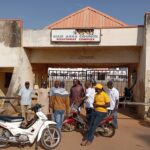… NACA urges stakeholders to commit to Nigeria’s HIV response
…Human rights violations, abuse undermine progress-UN
By Hassan Zaggi
The Federal Government has reiterated its commitment to ensuring that all pregnant women in Nigeria regardless of their location or socio-economic status have access to the needed healthcare services that will allow them give birth to HIV negative children.
The Minister of State for Health and Social Welfare, Dr. Iziaq Salako, stated this at the commemoration of the 2024 World AIDS Day, in Abuja, on Tuesday.
He stressed that Preventing Mother-To -Child Transmission (PMTCT) of HIV remained one of the cornerstone of the strategy of the current government.
The services, according to him, include antenatal care, HIV testing, ART for pregnant women living with HIV, and the provision of post-natal care to both mothers and babies, stressing that: “We are also enhancing the integration of HIV care within broader maternal and child health programs to make it easier for families to access services.”
The Minister assured that the President Bola Ahmed Tinubu-led federal government is committed to achieving the goal of ending AIDS by 2030 and that it is also determined to sustain the response where no child is left behind.
“This commitment is anchored under the Health Sector Renewal Investment Initiative and the various reforms to ensure availability of reliable data, medicine security including HIV treatment inputs, sustainable domestic resources mobilization, HIV service integration, strengthening oversight, improving coordination and so on,” he stressed.
Dr. Salako, therefore, called on all states and local governments, the private sector, partners, community and religious leaders, NGOs, CBOs and all stakeholders in the fight against HIV to “take the rights path” by scaling up interventions aimed at preventing HIV transmission among children.
“Our strategy must be holistic, addressing the social, cultural, and economic barriers that hinder access to healthcare services for women and children,” he noted.
Speaking, the Director General of the National Agency for the Control of AIDS (NACA), Dr. Temitope Ilori, urged all critical stakeholders to recommit to Nigeria’s HIV response.
“Let us focus on sustainability, equity, and protecting the rights of people living with HIV. Let us strengthen community-led initiatives, advocate for inclusive policies, and foster partnerships that accelerate our progress.
“Sustaining the HIV response requires providing equitable access to prevention, treatment, and care for everyone, regardless of status or location.
“To achieve this, we have been working closely with all critical stakeholders in the HIV response in co-creating a sustainability roadmap which intends to sustain the gains made within the HIV response and put government mandated structures at the core of programme implementation in the states.
“This roadmap, will ensure that in the event of donor support withdrawal, Nigeria can fully own and sustain the HIV response, securing the health and social well-being of its people against HIV and related diseases,” she said.
On his part, the United Nations (UN) Resident Coordinator and Humanitarian Coordinator in Nigeria, Mr. Mohammad Fall, lamented that despite the many achievements recorded in the global as well as national HIV and AIDS response, human rights violations and abuse continue to undermine the progress towards the 2030 goal of ending AIDS as a public health threat.
Children, according to him, also remain disproportionately affected by the HIV epidemic.
He noted that: “In Nigeria, 160,000 children are living with HIV, and many more are at risk of infection. With 8 million pregnant women yearly, only about 33% receive anti-retroviral treatment for their own health and to prevent the transmission of HIV to their babies.
“Regrettably, mother-to-child transmission of HIV rate is 23%. This is a stark reminder that our work is far from over.”
The UN Coordinator reiterated that the Convention on the Rights of the Child places obligations on all countries including Nigeria to act in the best interests of the child. These obligations, he explained, “extend to access to quality education -a right in and of itself, and a means to protect children from HIV.”



